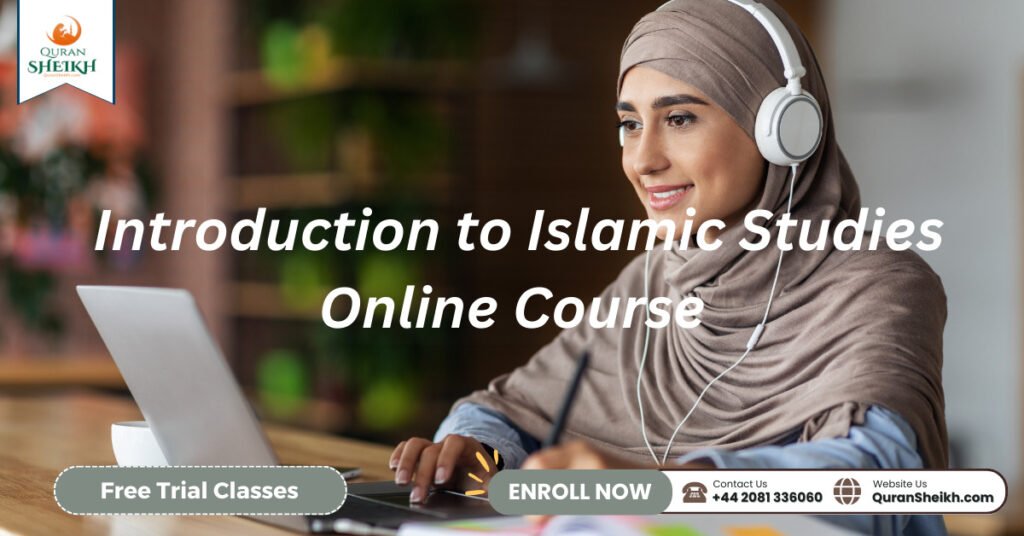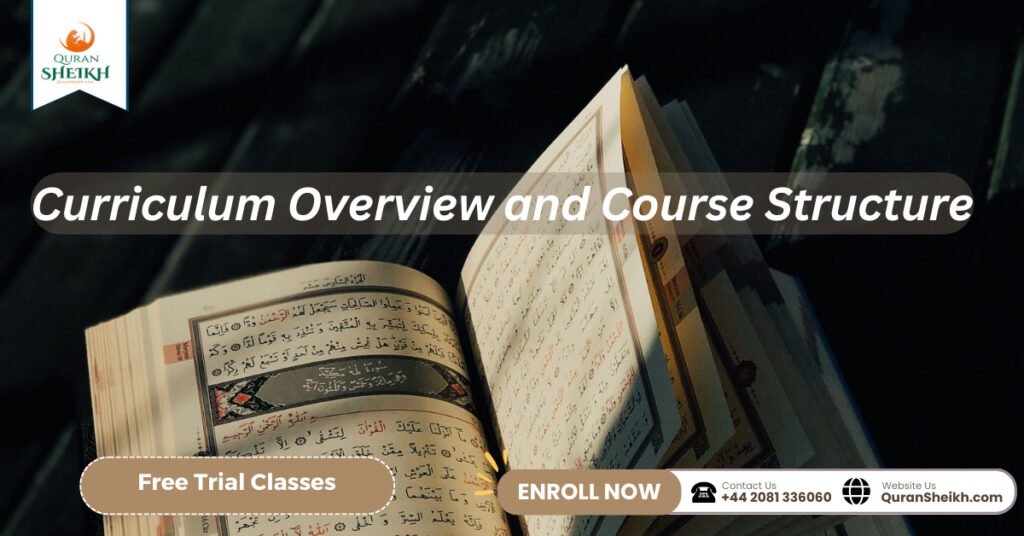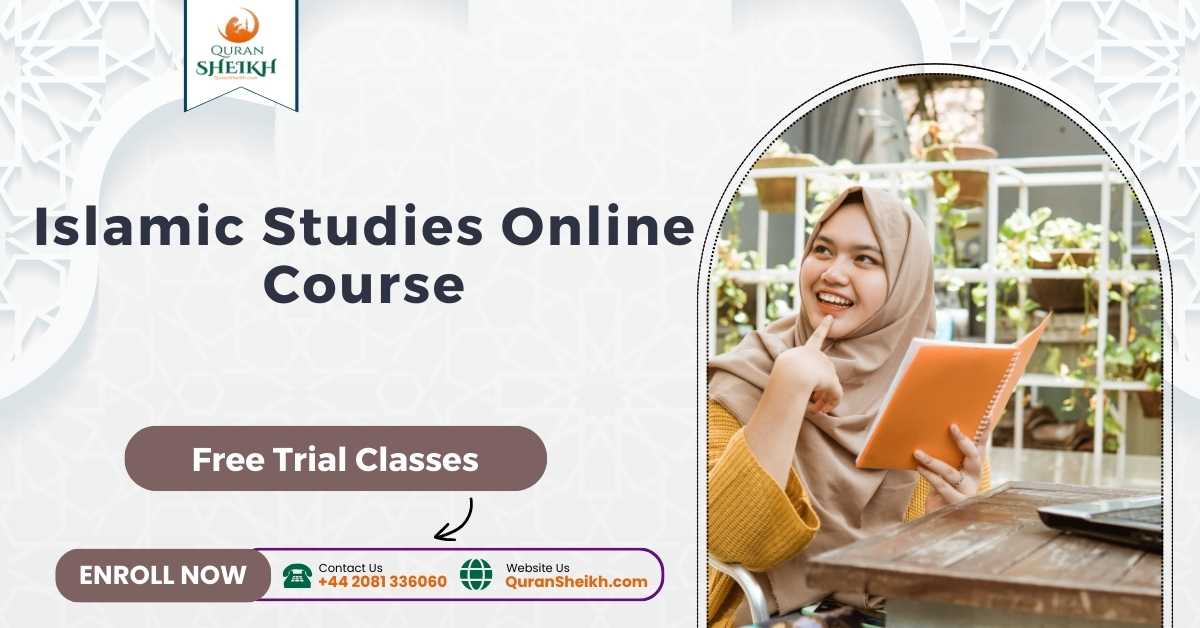1. Introduction to Islamic Studies Online Course
Islamic Studies Online Course provides a comprehensive and accessible platform for individuals interested in delving into the rich and diverse world of Islamic knowledge. In this article, we seek to give a broad perspective on the course, its syllabus, and the valuable perks it brings.
From understanding the fundamental principles of Islam to exploring its history, literature, jurisprudence, and more, this online course offers a structured and engaging learning experience.
If you have an interest in Islamic culture and traditions, whether as a student, scholar, or out of simple curiosity, this article is here to offer guidance on the key concepts, scholars, resources, and opportunities found within the domain of online education in Islamic Studies.
Join thousands of Muslim Families who love learning Quran, Arabic and Islamic Studies from the comfort of their Homes.
1. Introduction to Islamic Studies Online Course

1.1 What is Islamic Studies?
Cultural exploration, historical analysis, theological examination, and beyond are all part of the vast field of Islamic Studies in exploring different facets of Islam.
Delving into the bountiful and multifaceted customs of the Islamic faith, it offers a thorough comprehension of its fundamental tenets, convictions, rituals, and impact on mankind.
1.2 Importance of Islamic Studies
Understanding Islamic Studies is crucial in today’s interconnected world. It promotes intercultural dialogue, fosters tolerance and respect, and dispels misconceptions about Islam.
Furthermore, it allows for individuals to cultivate a more profound respect for the rich historical and intellectual legacy of Muslim scholars, while also obtaining valuable perspectives on the present struggles confronted by Muslim communities globally.
1.3 Introduction to the Online Course
This course provides a comprehensive introduction to the captivating realm of Islamic Studies, suitable for individuals from diverse backgrounds and varying levels of knowledge.
Through engaging lectures, interactive discussions, and thought-provoking assignments, you’ll explore the key concepts, themes, and scholarly works at your own pace, conveniently from the comfort of your own home.
2. Curriculum Overview and Course Structure

2.1 Course Objectives and Learning Outcomes
Our main focus in this class is to establish a strong base in Islamic Studies for you. At the conclusion, you will acquire an all-encompassing knowledge of different faculties within the domain of Islamic Studies, comprising historical aspects, Quranic investigations, Hadith literature, and laws related to Islam.
In addition, you will cultivate critical thinking abilities, gain an admiration for scholarly investigation, and acquire the capacity to participate in well-informed dialogues regarding Islam.
2.2 Topics Covered in the Curriculum
Join us in this course to delve into diverse fields including the enlightening history and civilization of Islam, interpreting Quranic text, comprehending the teachings of our esteemed Prophets through Hadith literature, and following the progression of Sharia law within Islamic jurisdictions.
In todays world, we will also explore modern-day concerns, such as the obstacles encountered by Muslim communities.
2.3 Course Duration and Format
Designed with flexibility and self-pacing in mind, this course enables you to study conveniently. Modules divide the curriculum and consist of video lectures, reading materials, quizzes, and assignments.
The course can be finished in approximately 12 weeks as recommended, but feel free to make adjustments according to your schedule. So, get ready to dive into this stimulating course and expand your knowledge of Islamic Studies!
Quran Memorization Course Online with an Arab teacher with 30% Off
3. Key Concepts and Themes Explored in the Course

3.1 Introduction to Islamic History and Civilization
Join us for an insightful expedition through this section as we transport ourselves back in time to uncover the wonders of the early Islamic era. Delve into a world that witnessed the ascent and diffusion of Islamic civilization while marveling at the groundbreaking achievements attained by Muslim scholars hailing from various domains like science, philosophy, and art.
3.2 Quranic Studies and Interpretation
Within these confines, we will delve into the Quran, the divine book of Islam. We’ll explore its structure, themes, and linguistic nuances, as well as the different methodologies of interpreting its verses. You’ll gain a deeper appreciation for the profound wisdom and guidance found within the Quran.
3.3 Hadith Literature and Prophetic Tradition
It is crucial to acknowledge that comprehending the practices and teachings of the Prophet Muhammad hinges upon recognizing the invaluable contribution of Hadith literature. This section invites us to delve into the science of Hadith, evaluating the authenticity of Hadith narrations and venturing into the vast collections of Hadith literature.
3.4 Islamic Jurisprudence and Law
Practical guidance on various aspects of life is offered to Muslims through Islamic Jurisprudence, also recognized as Fiqh. Our exploration will encompass the underlying principles of Islamic law, its methodologies, as well as its practical implications in various contexts, guiding you through the labyrinthine realm of scholarly Islamic jurisprudence.
4. Prominent Scholars and Their Contributions in Islamic Studies
4.1 Early Islamic Scholars
Within this designated section, our analysis will revolve around the notable personas who shaped early Islamic scholarship; these figures include Imam al-Bukhari, Imam Abu Hanifa, and Imam al-Ghazali. We’ll explore their intellectual contributions, methodologies, and enduring impact on Islamic thought.
4.2 Modern Islamic Scholars
Herein lies the opportunity to delve into renowned academics of recent decades, specifically Muhammad Iqbal, Fazlur Rahman, and Fatima Mernissi. We’ll examine their unique perspectives, innovative ideas, and profound influence on contemporary Islamic scholarship.
4.3 Influential Works and Publications
Throughout history, numerous scholarly works have shaped the field of Islamic Studies. Our exploration in this particular section will center around some noteworthy literary works such as Al-Muwatta by Imam Malik, The Reconstruction of Religious Thought in Islam by Muhammad Iqbal, and Women and Gender in Islam by Leila Ahmed.
With a taste of what awaits you in this web-based Islamic Studies course, it is now the opportune moment to set sail on this enlightening adventure. So, grab your virtual backpack and let’s dive into the captivating world of Islamic Studies!and Networking Opportunities
8.3 Expansion of Course Offerings and Specializations
5. Online Learning Tools and Resources for Islamic Studies
When it comes to studying Islamic studies online, the availability of learning tools and resources is crucial. Thankfully, the advent of digitalization has bestowed upon us countless alternatives to elevate our educational encounter. Virtual libraries and databases offer a treasure trove of books, articles, and scholarly materials right at our fingertips. These resources allow students to dive deep into various topics within Islamic studies and access a wealth of knowledge.
Multimedia resources and lecture series are also a great way to engage with the material. With podcasts, videos, and audio recordings, students can listen to expert speakers and expand their understanding of Islamic studies beyond traditional textbooks. These resources bring the subject to life and make learning both informative and enjoyable.
Additionally, interactive discussion forums and virtual study groups provide opportunities for students to engage in meaningful conversations with their peers and instructors. Through the use of digital platforms, students can raise queries, exchange thoughts, and actively participate in intellectual debates, creating a collaborative and vibrant learning space.
6. Assessments and Evaluations in the Online Course
Assessing and evaluating student progress is an important aspect of any education program, and online Islamic studies courses are no exception. Various assessment methods are used to gauge students’ understanding and retention of the material. These may include quizzes, exams, essays, and projects.
Grading criteria and evaluation methods are established to ensure fairness and transparency in the assessment process.
Rubrics are often provided to students, outlining the specific criteria on which they will be evaluated. This helps students understand the expectations and allows them to prepare accordingly.
Feedback and support for students are essential in an online learning environment. Instructors provide timely feedback on assignments and assessments, helping students identify their strengths and areas for improvement. Furthermore, coaches are present to offer individual mentorship and assistance, making sure that students attain the support needed for accomplishment.
7. Benefits and Advantages of Islamic Studies Online Learning
Islamic studies online learning offers numerous benefits and advantages that make it an attractive choice for many individuals. One of the key advantages is flexibility and accessibility. Online courses allow students to learn at their own pace, fitting their studies into their busy schedules. This flexibility also enables students from different parts of the world to access quality education without geographical barriers.
Another advantage is the opportunity to be part of a global and diverse learning community. Online courses bring together students from various backgrounds, fostering rich cultural exchanges and a broader understanding of Islamic studies from a global perspective.
Furthermore, self-paced learning and personalization are significant advantages of online learning.
The learning experience of students can be modified according to their specific needs, wherein they can concentrate on areas of interest and allocate ample time towards difficult topics. This personalized approach allows for a deeper engagement with the subject matter and a more fulfilling learning experience.
8. Future Developments and Opportunities in Islamic Studies Online Education
Looking forward, Islamic studies online education is poised for exciting developments and opportunities. Emerging technologies and innovations are continuously enhancing the learning experience.
By incorporating virtual reality, augmented reality, and artificial intelligence, online courses are transforming traditional learning into dynamic and engaging experiences.
The expansion of collaboration and networking opportunities is providing students with the chance to connect with scholars, experts, and fellow learners across the world. By using online platforms, students can involve themselves in research projects, interact with like-minded individuals in discussion groups, and participate in virtual conferences, fostering an environment that promotes collaboration and strengthens community ties.
Furthermore, the future holds potential for the expansion of course offerings and specializations in Islamic studies online education. As the interest in online learning keeps growing, universities and institutions are anticipated to widen the range of courses they offer, thus enabling students to pursue subjects aligned with their specific interests and develop expertise within their chosen academic domains.
In conclusion, the Islamic Studies Online Course provides a valuable opportunity to deepen one’s understanding of Islamic knowledge and heritage. Offering an interactive and valuable educational adventure, this course features a well-rounded curriculum, flexible learning alternatives, and a wide variety of resources.
By exploring the key concepts, engaging with prominent scholars, and utilizing online tools, students can broaden their perspectives and contribute to the promotion of intercultural dialogue and understanding.
Whether pursuing personal growth, academic advancement, or professional development, the Islamic Studies Online Course opens doors to a world of knowledge and opportunities. Start your journey today and embark on a path of discovery and enlightenment in the realm of Islamic Studies.
What is the highest degree in Islamic studies?
The highest degree in Islamic studies is the Doctor of Philosophy (PhD). It is a research degree that requires students to conduct original research on a topic related to Islam. PhD students in Islamic studies typically study a variety of subjects, including Quranic studies, hadith studies, Islamic law, Islamic theology, and Islamic history.
PhD programs in Islamic studies typically take 4-6 years to complete. Students must complete coursework, pass comprehensive exams, and write a dissertation. PhD dissertations in Islamic studies are typically original research monographs that make a significant contribution to the field.
PhD graduates in Islamic studies go on to work in a variety of fields, including academia, government, and the private sector. They may teach at universities, work as researchers, or work as consultants on Islamic issues.
How to become Islamic scholar?
To become an Islamic scholar, one must have a deep understanding of the Quran, the Sunnah, and Islamic law. This can be achieved through years of study and dedication. Scholars typically begin their studies at a young age, and they often attend specialized Islamic schools or universities. In addition to their academic studies, scholars also need to have a strong foundation in Islamic ethics and spirituality. They must also be able to communicate their knowledge to others in a clear and concise way.
Here are some specific steps that one can take to become an Islamic scholar:
- Develop a strong foundation in Islamic knowledge. This can be done by studying the Quran, the Sunnah, and Islamic law under qualified scholars.
- Gain experience teaching and mentoring others. This will help you to develop your skills in communication and pedagogy.
- Publish your research and writings. This will help to make your knowledge accessible to a wider audience.
- Become involved in Islamic community service. This will help you to apply your knowledge to real-world problems.
- Continue to learn and grow throughout your life. The Islamic scholarly tradition is a lifelong journey.
Becoming an Islamic scholar is a challenging but rewarding path. It requires dedication, hard work, and a deep commitment to Islamic learning. However, for those who are willing to make the sacrifice, it can be a truly fulfilling experience.
What are the objectives of Islamic Studies course?
The objectives of an Islamic Studies course can vary depending on the specific institution and instructor, but some common goals include:
- To introduce students to the basic tenets of Islam, such as the Five Pillars of Faith and the core beliefs and practices of Muslims.
- To provide students with a deeper understanding of Islamic history and culture, including its rich diversity and contributions to the world.
- To develop students’ critical thinking skills and their ability to engage with Islamic texts and ideas.
- To promote interfaith dialogue and understanding between Muslims and people of other faiths.
- To prepare students to live as Muslims in the modern world, by helping them to develop a strong sense of their own identity and values.
In addition to these general goals, Islamic Studies courses may also focus on specific topics such as Islamic law, theology, ethics, or Sufism. They may also be designed to meet the needs of students with different backgrounds and interests, such as those who are interested in becoming teachers, scholars, or religious leaders.
Overall, the goal of Islamic Studies courses is to provide students with a comprehensive and nuanced understanding of Islam, its history, and its role in the world today.
Best Quran memorization program with qualified Arab tutors and get 30% OFF, Quran classes for Kids
FAQ
1. Is prior knowledge of Islam required to enroll in the Islamic Studies Online Course?
No, prior knowledge of Islam is not a requirement for enrolling in the course. The course is designed to accommodate learners of various backgrounds, including beginners. It provides a comprehensive introduction to Islamic studies and covers key concepts and themes in a structured and accessible manner.
2. Can I interact with instructors and fellow students in the online course?
Yes, the online course offers opportunities for interaction with instructors and fellow students. Utilize discussion forums, virtual study groups, and live webinars to connect with the course community. These interactive elements foster collaboration, knowledge sharing, and the exchange of ideas.
3. What kind of assessments can I expect in the Islamic Studies Online Course?
The course utilizes a variety of assessments to evaluate your understanding and progress. These may include quizzes, written assignments, research papers, and discussion participation. By aiding in the consolidation of your knowledge, assessments also create avenues for self-reflection and personal growth.
4. Can I access the course materials and resources after completing the online course?
Assessments are intentional tools aimed at facilitating the consolidation of your knowledge and fostering opportunities for self-reflection and growth. However, specific access details may vary depending on the platform or institution offering the course. It is advisable to check the course policies or contact the course provider for more information regarding post-completion access.


